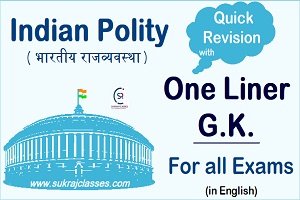
INDIAN POLITICAL SCIENCE- ONE LINER G.K. & QUESTIONS
Here we are providing a collection of INDIAN POLITICAL SCIENCE- ONE LINER G.K. & QUESTIONS which is important for all upcoming competitive exams i.e. CET, SSC, UPSC, NTPC etc. Students preparing for these exams, must go through it once at least.
![]() Constitution of India came into effect on 26th January, 1950.
Constitution of India came into effect on 26th January, 1950.
![]() The constitution of India was adopted by the Constituent Assembly on 26th November, 1949.
The constitution of India was adopted by the Constituent Assembly on 26th November, 1949.
![]() Right to property according to the constitution is Legal right.
Right to property according to the constitution is Legal right.
![]() Article 56 deals with the tenure of the President.
Article 56 deals with the tenure of the President.
![]() Article 61 deals with the impeachment of the President.
Article 61 deals with the impeachment of the President.
![]() Supreme Court held that the Preamble is not a part of the constitution in Berubari Union case (1960).
Supreme Court held that the Preamble is not a part of the constitution in Berubari Union case (1960).
![]() The current limit of creamy layer (for OBC) in India to decide the benefits of the reservation is 8 lakhs per annum. It’s Mean an annual income of both parents of ₹8 lakh or more excludes OBCs from availing reservation, putting them in the creamy layer category.
The current limit of creamy layer (for OBC) in India to decide the benefits of the reservation is 8 lakhs per annum. It’s Mean an annual income of both parents of ₹8 lakh or more excludes OBCs from availing reservation, putting them in the creamy layer category.
![]() National Commission for Other Backward Class came into effect from 1993.
National Commission for Other Backward Class came into effect from 1993.
![]() Procedure for the amendment of the Constitution is taken from South Africa.
Procedure for the amendment of the Constitution is taken from South Africa.
![]() Farming is mainly served by the Co-operative Societies in India.
Farming is mainly served by the Co-operative Societies in India.
![]() State reorganisation committee was appointed in 1953.
State reorganisation committee was appointed in 1953.
![]() Central Vigilance Commission established in 1964.
Central Vigilance Commission established in 1964.
![]() 42th amendment acts amended the Preamble of the Indian constitution.
42th amendment acts amended the Preamble of the Indian constitution.
![]() In a parliamentary form of Government, the real powers of the state are vested in the Council of ministers headed by the Prime Minister.
In a parliamentary form of Government, the real powers of the state are vested in the Council of ministers headed by the Prime Minister.
![]() The independence of Judiciary in Indian constitution is taken from USA.
The independence of Judiciary in Indian constitution is taken from USA.
![]() Preamble of the constitution describes India as a secular state.
Preamble of the constitution describes India as a secular state.
![]() The first Parliamentary Forum on Youth constituted in 2006.
The first Parliamentary Forum on Youth constituted in 2006.
![]() Shri Amitabh Kant (Please update it yourself time to time) is the CEO of NITI Aayog.
Shri Amitabh Kant (Please update it yourself time to time) is the CEO of NITI Aayog.
![]() Rajiv Kumar (Please update it yourself time to time) is the Vice Chairman of NITI Aayog.
Rajiv Kumar (Please update it yourself time to time) is the Vice Chairman of NITI Aayog.
![]() The total number of Schedules in the constitution are 12.
The total number of Schedules in the constitution are 12.
INDIAN POLITICAL SCIENCE- ONE LINER G.K. & QUESTIONS

